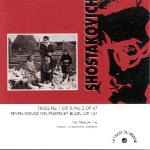How can someone listen to–or play–Shostakovich without placing him historically or politically? So much of his music was written as an overt or indirect response to what was going on around him (the Second World War, the plight of Soviet Jews, his own standing as a composer) that one can’t do justice to his music without considering these elements. I had hoped that a Russian trio would give us a recording that could shine some insightful light on these Shostakovich scores, but nothing doing here. In fact, it’s the exact opposite; it’s often as if these performers had no familiarity with him at all. Everything is played at what amounts to face value, precisely the wrong approach in music where nothing is what it seems.
This is most evident in the Trio No. 2, the best known of these three works. The first indication from Shostakovich that we should look for undercurrents of meaning comes with the first movement’s unsettling opening, which fools the ear with the cello’s high-pitched harmonics and the violin lying beneath. On this disc, it’s just quiet and slow and completely meaningless. The famously deranged scherzo that forms this same trio’s second movement is certainly fast, but these players betray no hint of the reckless madness that saturates the Allegro con brio’s character. The Moscow Trio actually manages to sound genuinely joyful here. The following Largo is painfully slow, creeping through the score at an unlistenable pace. The last movement fares a little better: there’s a hint of despair, particularly from pianist Alexander Bonduriansky, but it’s not enough to rescue us from the preceding banality.
The upside to this recording is a chance to hear the other two rarely performed works. Shostakovich’s first trio, written when he was 17, is quite short (a little more than 10 and a half minutes), but in it we hear where the composer was headed in his later works, especially in terms of his instantly recognizable rhythmic patterns and distinctive texturing. The program’s real highlight is the song cycle set to Alexander Blok’s poetry. Here, soprano Natalia Gerassimova paints a bleak and desolate landscape. Where the ensemble failed in the Trio No. 2, it succeeds in these settings, most notably violinist Vladimir Ivanov, an able partner for Gerassimova. The sound is slightly dry and distant throughout.
































